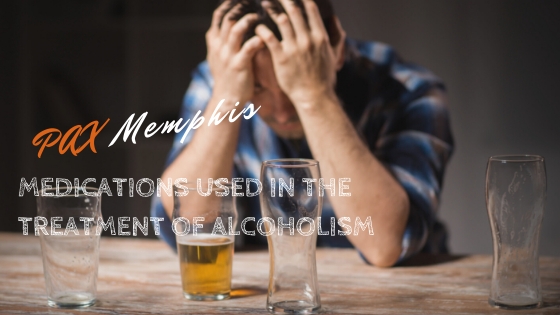Although no known drug effectively and completely cures alcoholism, there are three medications that are approved to treat the symptoms of alcoholism or alcohol use disorder. It’s important to note that none of these medications address the behavioral issues that often arise as a result of alcohol abuse, but instead, they help curb cravings and lessen withdrawal symptoms. Withdrawals and cravings are two of the most challenging hurdles that people in recovery have to overcome. By reducing these physiological symptoms, medications that treat alcoholism are useful when combined with behavioral therapies, and recovery support services.
Disulfiram, acamprosate, and naltrexone are the three medications that are FDA-approved for the treatment of alcohol use disorder.[1] Although these medications cannot be administered during detox, other medications may be used for off-label purposes to help ease withdrawal symptoms. However, it’s important to note that the key component of medication-assisted treatment for alcoholism is that it is used in combination with a comprehensive addiction treatment program. People with severe alcohol use disorder who rely on medication alone rarely see the results they are aiming for when it comes to long-term sobriety.
Disulfiram
Disulfiram was approved by the FDA in 1951 and was the first medication used to treat alcoholism. This drug is commonly known as Antabuse and is widely known to make people sick if they drink while taking it. Disulfiram changes the process in which the body breaks down and processes alcohol, so people experience sweating, headaches, nausea, and vomiting if they drink while taking it.[2] This unique feature is what helps the medication prevent alcohol abuse in some people.
The main concern with this drug is that people who drink while on Disulfiram might begin to associate the medication with sickness, ultimately convincing them to stop taking the medicine. As a result, this medication is usually used in patients who are highly motivated or are supervised while they take their medications. People who are known to abuse their medications or fail to comply with their physician’s advice should not take disulfiram.
Acamprosate
Acamprosate, or Campral, helps reduce withdrawal symptoms and cravings by normalizing brain chemistry that has been affected by alcohol abuse. When people stop drinking, many experience anxiety, depression, insomnia, restlessness, and a general lack of well-being. Unfortunately, these symptoms can last for several weeks or months, making them extremely challenging to cope with. By normalizing brain chemistry, acamprosate helps people feel more relaxed, rested, and medically stable. One drawback of acamprosate is that a person must detox from alcohol before they begin taking it in order for the medication to work.
Naltrexone
Naltrexone, which comes in a pill or a monthly injection (Vivitrol), is the newest medication available for the treatment of alcoholism and alcohol use disorder in the United States. At the same time, the drug is also used to treat opioid addictions. The medication helps reduce cravings, which ultimately reduces relapse rates. Furthermore, if people drink while taking naltrexone, they won’t feel the pleasurable effects of alcohol. This helps break the connection between alcohol and reward, therefore, reducing the desire to drink.[2]
Unlike Antabuse, you won’t get sick if you drink while taking naltrexone, however, you won’t a euphoric reward from it, either. In order to promote medication-adherence, the once-monthly injection of naltrexone, Vivitrol, is the preferred method of administration by many physicians and recovering alcoholics alike due to its low risk of abuse and low maintenance administration schedule.
Other Medications
Since the medications used to treat alcohol use disorder can’t be taken during alcohol detox, other medications are used off-label to reduce withdrawal symptoms. Although there are no medications that prevent alcohol withdrawal completely, benzodiazepines, blood pressure medications, and anti-seizure medications are used to lessen the physiological symptoms of withdrawal, prevent fatal seizures, and keep patients comfortable. Medications used during alcohol detox may include:
- Valium, Librium, or Tranxene
- Clonidine
- Haloperidol
- Carbamazepine
- Propanolol
- Baclofen
While these medications are effective in lessening and managing alcohol withdrawal symptoms, you should never take any of these drugs without medical supervision – especially if you are detoxing from alcohol or other intoxicating substances. Moreover, people detoxing from alcohol should remain under a physician’s supervision while taking any of the above medications.
Benefits of Medication-Assisted Treatment for Alcoholism
The National Institute on Alcohol Abuse and Alcoholism explains that these medications have many benefits in the treatment of alcohol use disorder, including:[1]
- All three medications are not addictive or habit-forming
- The use of these medications are associated with better treatment outcomes (when combined with counseling)
- Medication-assisted treatment is associated with higher treatment retention rates
- Medication management is linked to lower relapse rates
Furthermore, by utilizing the off-label use of benzodiazepines and other medications, withdrawal symptoms can be managed to make for a safe and comfortable rehabilitation experience.
Using medications to treat alcoholism isn’t for everybody. You should speak to an addiction specialist to determine which course of treatment is best for you.
Find Help from an Alcohol Rehab Today
Giving up alcohol isn’t easy. Medications used to treat alcoholism can make the journey easier, but therapy and counseling are where the real work and healing is done. If you’re looking for evidence-based alcohol treatment, contact our addiction specialists in Memphis, TN today.
References:
Medically Reviewed: September 25, 2019

All of the information on this page has been reviewed and verified by a certified addiction professional.










